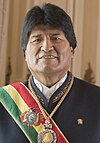Álvaro García Linera
Álvaro García Linera | |
|---|---|
 | |
| Vice President of Bolivia | |
| Assumed office January 22, 2006 | |
| President | Evo Morales |
| Preceded by | Carlos Mesa |
| Personal details | |
| Born | October 19, 1962 Cochabamba, Bolivia |
| Political party | Movement for Socialism |
| Occupation | Vicepresident |
Álvaro Marcelo García Linera (Spanish: [ˈalβaɾo ɣarˈsi.a]; born 19 October 1962), is a Bolivian politician who has been Vice President of Bolivia since 2006.[1]
Biography
He was born in Cochabamba and graduated from San Agustín High School. Then, he studied mathematics at the National Autonomous University of Mexico in Mexico City but did not obtain a degree. After failing his studies at UNAM, he returned to his native Bolivia and attempted to put some of his long-held socialist ideology to practice and joined the Katarist "Ayllus Rojos", a series of experimental, Marxist-inspired native communities in northwestern Bolivia. When this attempt at grass-roots politics failed, García opted for a more radical approach. Alongside Felipe Quispe, he organized and worked in the insurgent Tupac Katari Guerrilla Army. After being caught destroying electrical distribution towers in rural La Paz, he was arrested and charged with insurrection and terrorism. In 1991, along with his brother Raul, he was convicted for theft of $441,000 destined to pay salaries of teachers of a local university (12), to this date, even thought he was found guilty, he continues to pressure the government to return the money that was confiscated from that crime. UMSS, the university affected is also trying to get their money back and get legal action against the Garcia Lineras and their gang.
While imprisoned, he studied sociology but did not obtain a degree failing again. After his release he taught at a university illegally since Bolivian universities require their faculty to have a professional degree. He also was a political analyst, and news commentator. He made people think he is an academic, but he does not hold any academic degree, known for his support of indigenous and left-wing political movements in South America (in spite of his upper-middle class upbringing and the fact that he is of Spanish descent). He wrote a monograph about the different political and social organizations that were a part of the political rise of the MAS and other indigenous factions, Sociología de los Movimientos Sociales en Bolivia (Sociology of Social Movements in Bolivia), which was published in 2005.[2]
Political career
García was elected vice president as the running partner to Evo Morales in the 2005 presidential elections.
He is an advocate of nationalization of Bolivia's hydrocarbon industry. In 2005 interview, he said that hydrocarbons "would be the second unifying factor of this society in October, 2003" and that "the debates over hydrocarbons are playing with the destiny of [Bolivia]."[3]
In December 2010, Linera posted the cables mentioning Bolivia from the website WikiLeaks, which leaks information from classified sources and whistleblowers, on his official page. Linera said linking this negative information was intended to allow people to see “barbarities and insults” in Washington and to expose their "interventionist infiltration."[4][5][6]
García Linera has defended the Law of the Rights of Mother Earth, saying that it is not intended as a means to hamper industrial development or mineral extraction. Private miners have disagreed with this stance, suggesting that the law allows the government to expropriate their operations without providing compensation and that is signals Bolivia is hostile to foreign investment.[7]
García Linera has indicated his intention of leaving politics for teaching and writing in 2014, at the end of his current term. [8] He did not comment on his re-election the same year to the present day.
Personal life
On March 8, 2012, García Linera publicly confirmed his engagement to Claudia Fernández Valdivia, a news anchor with Bolivian television station Red Uno.[8] They were married in September 2012, holding an indigenous ceremony on Saturday the 8th and a Catholic one on Sunday the 9th.[9][10]
Interviews, speeches and articles by Álvaro García Linera
- “The MAS is of the Centre-Left” An interview with Álvaro García Linera by Pablo Stefanoni, International View Point, December 2005
- Marxism and Indigenism in Bolivia: A Dialectic of Dialogue and Conflict, Z Net, April 2005
- Indianismo and Marxism: The mismatch of two revolutionary rationales, Links, 2005
- "Neo-liberalism and the New Socialism – Speech by Alvaro Garcia Linera", Political Affairs, January-February 2007
- Bolivia: Coming to Terms with Diversity, Laura Carlsen interviews Alvaro Garcia Linera, 2007
- Catastrophic equilibrium and point of bifurcation, Bolivia Rising, May 2008
References
- ^ Vicepresidency of Bolivia
- ^ Garcia Linera, Alvaro. Sociología de los Movimientos Sociales en Bolivia. La Paz: Plural, 2005.
- ^ Webber, Jeffery R. (25 April 2005). "Marxism and Indigenism in Bolivia: A Dialectic of Dialogue and Conflict". ZCommunications. Retrieved 3 December 2012.
- ^ "Bolivian VP Posts WikiLeaks Cables on his Website". Fox News Latino. 8 December 2010. Retrieved 21 November 2012.
- ^ Wikileaks - Vicepresidency of Bolivia
- ^ "Documentos revelados por Wikileaks ratifican un gobierno imperial, intervencionista y abusivo: García Linera". FM Bolivia. 30 November 2010. Retrieved 21 November 2012.
- ^ Achtenberg, Emily. "Earth First?". Knowledge Beyond Borders. NACLA. Retrieved 20 November 2012.
- ^ a b El vicepresidente García confirma su proxima boda e insinúa su retiro de la politica para el 2014. La Razon - March 12, 2012
- ^ http://www.laprensa.com.bo/diario/entretendencias/escena/20120909/la-pachamama-los-bendijo_33473_53530.html
- ^ http://alvarogarciayclaudiafernandez.blogspot.com/2012/09/fotos-el-vicepresidente-y-claudia.html
12. http://www.bolivia.com/noticias/autonoticias/detallenoticia30228.asp)

